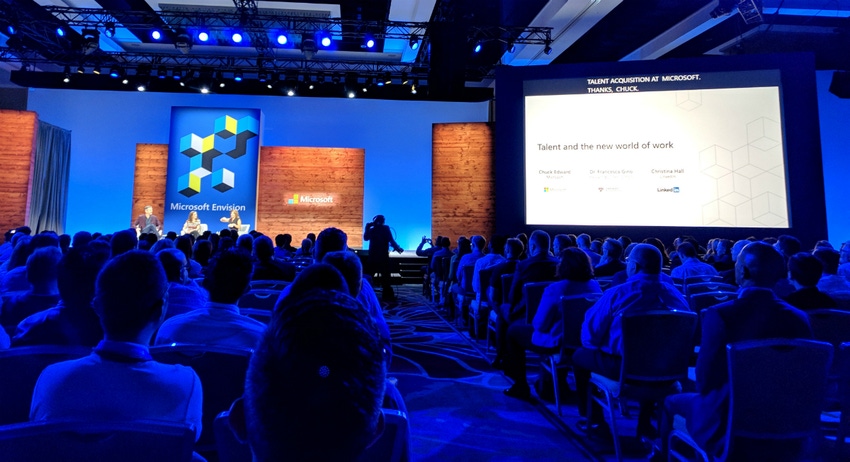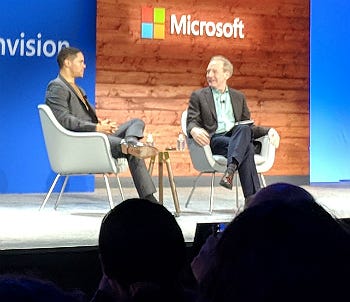Diversity isn't about fitting in, it's not charity, and it's not a problem to solve.
September 26, 2018

MICROSOFT ENVISION — It’s time to embrace the future of talent and changes impacting the world of work, particularly considering digital transformation and the challenge to fill critical IT positions and foster robust work environments.
While the volume on conversations about diversity has increased, the changes looming over the world of work also include flexibility and the rise of the multigenerational workforce. At the same time, you can’t talk about this topic without addressing the economic and skills gap. And that’s exactly what moderator Christina Hall, senior vice president and chief people officer at LinkedIn; and panelists Francesca Geno, Harvard Professor and author of Rebel Talent; and Chuck Edward, head of global talent acquisition at Microsoft discussed in the session, “Talent and the New World of Work” Wednesday at Microsoft Envision in Orlando, Florida.
Addressing diversity, the panelists acknowledged what keeps rising to the top, and that is that the evidence is clear — diversity improves team performance and decision making. Also, millennials are more likely to stay at a company where they see a diverse workforce.
There’s an uncomfortable truth, however, about diversity that doesn’t get discussed.
“Leaders make a difference there,” said Geno. “It’s like going to the gym — no pain, no gain. In the moment, being challenged by a diversity of opinions during a discussion at a meeting doesn’t feel good, but you need to accept that pain. Leaders needed to create an environment where differences in perspectives are welcome and are viewed as additive rather than detractive.”
Companies that are successful at diversity don’t view it as a problem to solve; instead, they leverage differences.

The Daily Show’s Trevor Noah (left) on stage at Microsoft Envision with Microsoft’s Brad Smith, Sept. 26.
In the closing Envision keynote with Trevor Noah, comedian and businessman, and Brad Smith, president and chief legal officer at Microsoft, Noah commented on diversity and inclusion in the workplace.
“It’s not charity,” he said.
“We need to live in a world where people acknowledge that, unfortunately, you’re more likely see and want to hire someone who reminds you of you, whether you realize it or not. Innately as a human, you think they’ll be least likely to disrupt my world.”
While Noah said that’s not necessarily a bad thing, what’s important is how you act on it.
Microsoft’s Edward noted that at Microsoft they talk about inclusion rather than diversity.
“It’s the idea that you can track who gets invited to a given party, but do they want to stay at that party? What makes someone want to stay at your company and, more importantly, do their best work. People have to feel safe, they have to feel supported and they have to feel like they can lead the dialogue,” he said.
Diversity isn’t about fitting in or assimilating.
Microsoft is rethinking the hiring screening process by moving away from …
… a laundry list of attributes for a job candidate to thinking about how the company can make a situation work.
“Rather than screen out, we screen in,” Edward said.
“Once you change your mindset, then you get to look at different pathways to bringing someone into the company – is it as an intern, an apprentice, is it someone with a high school degree, or someone directly from the military who has software and systems experience, someone on the autism spectrum – it takes the mindset off of, ‘This is different,’ to ‘Let’s embrace it with a screen-in mentality.’”
However, this strategy only works when people show up and they see that the company is being inclusive, and they want to stay on the journey.
Geno talked about the importance of curiosity as a key ingredient in staying creative, innovative and looking at problems from a different perspective. Unfortunately, curiosity peaks at 4 to 5 years old, and according to research, curiosity in the workplace drops by 20 percent after six months.
Edward talked about the need people have to be continuous learners, noting that it’s not about what you know, but more about what you learn. Companies, however need to foster workplaces where it’s OK not to have all the answers and be empowering rather than punitive.
This discussion tied in with the skills gap that’s stressing out a lot of companies today, particularly as they compete for ready-now talent. And what happens when they can’t find it?
That’s where businesses need to start thinking about talent as a continuum. Companies need to think about job candidates with some, but not all, attributes and learn to screen in. If a professional can learn, they can be skilled for the future.
“Even if they’re not perfect from day one, they’ll get there, and we must help them get there,” said Edward.
A lot of the discussion about the future of work revolved around trust, flexibility and the fear of letting go. Think about how companies feel about flexible employee schedules or changeable work locations compared to traditional time and space models.
Geno talked about meeting business leaders, many who have a fear of letting go, whether that means an employee isn’t sitting at a desk in the office or their hours vary. How business leaders feel about not having control over their employees – will they work or take advantage of the situation? – changes the way you keep a worker engaged.
“Rebel leaders are happy to give a little bit of control away, and those who embrace this have people who work for them who feel trusted and make sure they get their work done — they feel empowered,” she said, adding that more business leaders need to move away from a mindset where they fear losing control.
Read more about:
AgentsAbout the Author(s)
You May Also Like


